Column: Let’s link housing to health care
| Published: 12-18-2023 11:23 AM |
On Dec. 21, we will celebrate the Winter Solstice, the longest night and shortest day of the year. Here in the Upper Valley, it is usually a very cold evening. It is also, the annual commemorative candlelight vigil to remember those homeless individuals who have died during the past year. The vigil will take place from 5:30 to 6:45 on Dec. 21 at the Listen Center in White River Junction.
Recently, on Nov. 15, our state Rep. Rebecca Holcombe, D-Norwich, organized a panel discussion on housing. The panel consisted of Vermont State Treasurer Mike Pieciak, who discussed Vermont’s efforts to invest in housing, climate and social equity initiatives; Jeff Lubell, chair of the Norwich Affordable Housing subcommittee, a national expert on housing and employment zoning; Ann Sosin, a researcher on housing policy at the Rockefeller Center at Dartmouth College; and Neil Odell, a Norwich School Board member and an expert in the relationships between housing and Vermont’s education funding formulas.
From the ensuing discussion, it was apparent that housing is a multifaceted, challenging issue: beginning with the effects of the rising costs of materials due to inflation and supply chain issues; the lack of skilled tradespersons; decisions affecting financial investments; the lack of workforce housing; medical issues affecting wages and one’s ability to borrow; zoning, septic and water accessibility; how affordable housing affects an individual’s ability to access certain school districts for their children, etc.
I would like to focus on individuals suffering with chronic physical or complex health issues, mental illness and substance use disorders, and how they intersect with the lack of housing. As a physician, I am well aware that safe and affordable shelter is an important determinant of a person’s health.
In 1963, President John F. Kennedy signed into law the Community Mental Health Act, shifting the treatment of mental health disorders from institutional care to care offered in outpatient mental health centers. While this has resulted in positive outcomes for millions of Americans, inadequate funding has resulted in many individuals who would benefit from effective mental health support not receiving care. Those who lack access to these services may need to seek accommodations in homeless shelters; health care in emergency rooms; and unfortunately, as a last resort, oftentimes find themselves incarcerated by the criminal justice system. In the Upper Valley, many of our mentally ill residents go unnoticed, but on trips to any of our major cities, we see the inhumane way we care for our neighbors dealing with risk factors that set them up for inadequate shelter. We literally show more kindness to our pets and animals.
Medicaid is a program administered by the federal and state governments. They devise the rules, and they have, in general not allowed Medicaid to pay for housing development or for rent. States, however, are encouraged to apply for waivers. One such waiver, a 1115 Demonstration Waiver is an “experimental pilot, or demonstration project that are found to likely assist in promoting the objectives of the Medicaid Program.” The 1915c Home and Community Based Services (HCBS) waiver, “is designed to provide services that are less costly than institutions, services that are individualized and person centered. HCBS waivers can cover housing pre-tenancy services; tenancy sustaining services; and transition services.
Numerous studies have shown a strong association between positive health outcomes and safe, affordable and stable housing. Housing that includes support services reduces excessive use of emergency room services; reduces health care needs of residential homeless shelters and reduces the necessity to rely on our prison system.
Hawaii was granted a Medicaid waiver to address individuals with mental health disorders that interfere with their ability to carry out their daily activities; those with substance use disorders; those with chronic physical or chronic health needs; and those with frequent emergency room (ER) use.
Article continues after...
Yesterday's Most Read Articles
 A Look Back: Upper Valley dining scene changes with the times
A Look Back: Upper Valley dining scene changes with the times
 Kenyon: Dartmouth shows it has no patience for peaceful protest
Kenyon: Dartmouth shows it has no patience for peaceful protest
 Hartford Selectboard considers banner policy amid controversy over ‘Hometown Heroes’ project
Hartford Selectboard considers banner policy amid controversy over ‘Hometown Heroes’ project
 Killington is the East’s largest ski resort. A developer wants to expand on that in a big way.
Killington is the East’s largest ski resort. A developer wants to expand on that in a big way.
Through the waiver, public and private stakeholders in Hawaii have partnered to implement a “housing first” program. This partnership involves the Hawaii Public Housing Authority; the state’s Mental Health and Alcohol and Drug Division; the Hawaiian Governor’s Homeless Coordinator; multiple social services and private agencies; as well as community health centers.
A report on the Hawaii/ Pathway Project (HPP) August 2014 – September 2015 reported that there were fewer ER visits; less involvement with the criminal justice system; a decrease in drug and alcohol usage; a 97% retention rate and a net saving from reduced Medicaid spending among HPP clients of $2,370 per month.
The Upper Valley is unique in that it straddles two states, each with different ways of administering Medicaid programs. We are fortunate in that we see a lot of cooperation in how nonprofits are able to work across the river. Dartmouth Hitchcock is affiliated with medical centers both in Vermont and New Hampshire, and other non-profits also work in both states: the Good Neighbor Health Clinic in White River Junction and Lebanon; Twin Pines Housing Trust provides affordable housing in Windsor and Orange counties in Vermont and Grafton and Sullivan counties in New Hampshire; the Haven provides food, temporary shelter and supportive services for those in need, and collaborates with agencies in New Hampshire. We need these agencies to be creative in working together to expand their impact for the better, in both states.
Will this be easy? No. Shouldn’t we at least try? Yes! Hawaii his given us a blueprint, we need to get all the stakeholders in the same room to address this housing issue and come up with a Vermont and New Hampshire plan. Not making the effort is not only unjust, but inhumane.
Paul Manganiello is co- medical director at Good Neighbor Health Clinic. He lives in Norwich.

 Editorial: Response to campus protests only adds fuel to the fire
Editorial: Response to campus protests only adds fuel to the fire Editorial: Chris Sununu’s moral vacuum
Editorial: Chris Sununu’s moral vacuum Editorial: Gambling tarnishes America’s sporting life
Editorial: Gambling tarnishes America’s sporting life By the Way: A white nationalist’s many mistruths
By the Way: A white nationalist’s many mistruths
